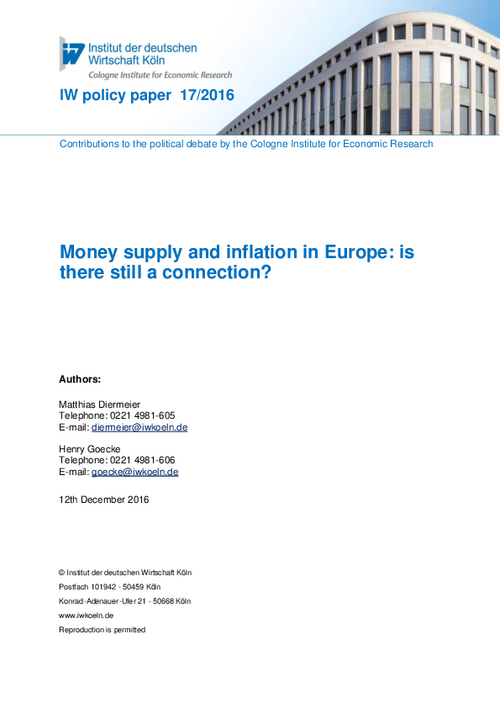Since the outbreak of the European financial and economic crisis in 2008, the monetary policy of the European Central Bank (ECB) has been in crisis mode. Ensuring that the growth in the money supply transmutes into higher inflation or inflation expectations has been difficult.

Money supply and inflation in Europe: Is there still a connection?
IW policy paper

Since the outbreak of the European financial and economic crisis in 2008, the monetary policy of the European Central Bank (ECB) has been in crisis mode. Ensuring that the growth in the money supply transmutes into higher inflation or inflation expectations has been difficult.
The central bankers are attempting to get a grasp on the current low inflation rates and inflation expectations by, among other things, introducing a policy of extreme quantitative easing. The expansion of the Eurosystem's balance sheet was problem-free on this occasion, and the ECB also managed to eventually increase the money supply again. However, ensuring that the growth in the money supply transmutes into higher inflation or inflation expectations has been much more difficult.
Results of the empirical assessment
- The formulation of an appropriate monetary policy for the heterogeneous country groups of the euro area remains a challenge.
- Controlling the money supply is now the last option remaining out of three monetary policy instruments.
- Monetary developments have become disconnected from inflation developments. At present a structural break exists for the various euro area countries.
- The ECB's asset purchase programme and the accompanying shift from long-term to short-term assets on banks’ balance sheets is partly responsible for this development.
- In the current regime of extremely low interest rates, there is a strong connection between the liabilities and lending of commercial banks and inflation for individual countries.
- Two problems stand in the way of a universally effective monetary policy in the euro area: real economy divergence and the different ways in which financial intermediation works in the different countries.
Recommendations
- Monetary policy must focus on boosting private demand through increased lending in order to achieve the inflation target.
- On the demand side, a reduction in the general and political uncertainty is necessary, while on the supply side, critical reflection on the regulatory guidelines is required.
- In order for monetary policy to once again be effective in all euro area countries, the banks must be able to fulfil their roles properly. A clean-up of banks’ balance sheets and the write-off of non-performing loans are desperately needed.
- Recommendations 2 and 3 cannot be resolved through monetary policy. The governments of the respective Member States must take action. These must raise the employment intensity of growth and push ahead with the regulatory and supervisory clean-up of banks’ balance sheets.

Matthias Diermeier / Henry Goecke: Money supply and inflation in Europe – Is there still a connection?
IW policy paper

More on the topic
Not so Different?: Dependency of the German and Italian Industry on China Intermediate Inputs
On average the German and Italian industry display a very similar intermediate input dependence on China, whether accounting for domestic inputs or not.
IW
China’s Trade Surplus – Implications for the World and for Europe
China’s merchandise trade surplus has reached an all-time high and is likely to rise further. A key driver appears to be a policy push to further bolster Chinese domestic manufacturing production, implying the danger of significant overcapacities.
IW